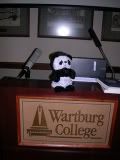 A looong time ago, I mentioned that I spent St. Patrick's Day weekend in Wartburg College in Waverly, Iowa, at a symposium I helped to plan (but neglected to blog! Oops). Along with other scientists, theologians, philosophers, and generally interested persons, we worked for a bit over a year to put this symposium together. Why?
A looong time ago, I mentioned that I spent St. Patrick's Day weekend in Wartburg College in Waverly, Iowa, at a symposium I helped to plan (but neglected to blog! Oops). Along with other scientists, theologians, philosophers, and generally interested persons, we worked for a bit over a year to put this symposium together. Why?
The principal aim of the conference is to clarify the causes of the conflict between science educators and those who wish to have Intelligent Design taught in public schools. We do not claim to be neutral on this issue. We are convinced that ID is not good science and should not be presented as such. Our position is consonant with that of the National Center for Science Education and the Iowa Academy of Science. We believe that the polarization of opinion on this issue has created misunderstanding and confusion and that a clarification of terminology and concepts is essential for productive dialogue and decision making.
How did it turn out? Find out more below...
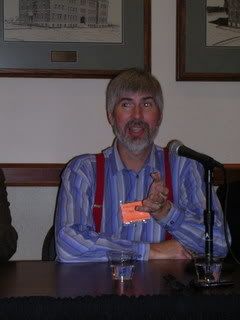 We wanted to make this more than just a lecture or two. As the name of our group suggests, we really wanted to get a dialogue going, whatever their position might be regarding science or religion. We arranged the conference around three keynote speakers. Friday evening featured Panda's Thumb contributor extraordinaire Wesley Elsberry, who gave an overview of the history (and demise) of creationism and intelligent design.
We wanted to make this more than just a lecture or two. As the name of our group suggests, we really wanted to get a dialogue going, whatever their position might be regarding science or religion. We arranged the conference around three keynote speakers. Friday evening featured Panda's Thumb contributor extraordinaire Wesley Elsberry, who gave an overview of the history (and demise) of creationism and intelligent design.
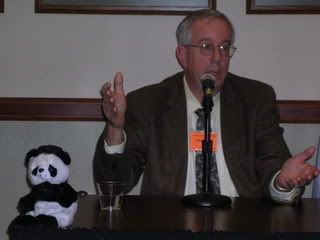 Saturday morning began with a lecture by theologian John Haught of Georgetown University, on reconciling science and religion. Haught discussed his views as a philosopher and a Catholic on how he views the interaction of evolutionary biology and religious thought (you can get a feeling for his views in this essay).
Saturday morning began with a lecture by theologian John Haught of Georgetown University, on reconciling science and religion. Haught discussed his views as a philosopher and a Catholic on how he views the interaction of evolutionary biology and religious thought (you can get a feeling for his views in this essay).
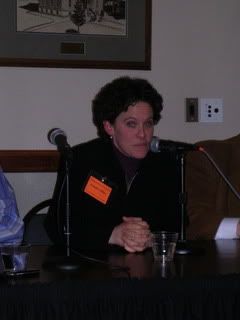 Dover, Pennsylvania biology teacher Jennifer Miller (home of the Kitzmiller vs. Dover trial) gave the last talk of the symposium, discussing the events that took place in her district in 2004-5 during the whole intelligent design controversy. A panel discussion with all the speakers followed Saturday's talks.
Dover, Pennsylvania biology teacher Jennifer Miller (home of the Kitzmiller vs. Dover trial) gave the last talk of the symposium, discussing the events that took place in her district in 2004-5 during the whole intelligent design controversy. A panel discussion with all the speakers followed Saturday's talks.
On Saturday, symposium attendees were also given their choice of three workshops, allowing them to break up into smaller groups for more in-depth discussion of a number of topics. I helped lead a workshop expanding on what Wesley spoke about (and giving an introduction to those who'd not been able to make his Friday evening talk). Other workshops focused on critiquing the "science" or theology of intelligent design; the history of the religion/science conflict (if, indeed, one exists...), and how to relate the two areas; interpreting Biblical creation stories; God after Darwin; and lessons from the Kitzmiller vs. Dover trial. We seemed to get a good mix of school teachers, theologians/clergy/Sunday school teachers, college professors and professional scientists, and just folks who'd heard a bit about "intelligent design" and wanted to find out what the big deal was. From my vantage point, the workshops seemed to go over very well. I know in ours, at least, we had some good discussions running (including such topics as the politics of ID, how scientists should respond to it, etc.), and I talked to a number of participants throughout the symposium and all had encouraging feedback.
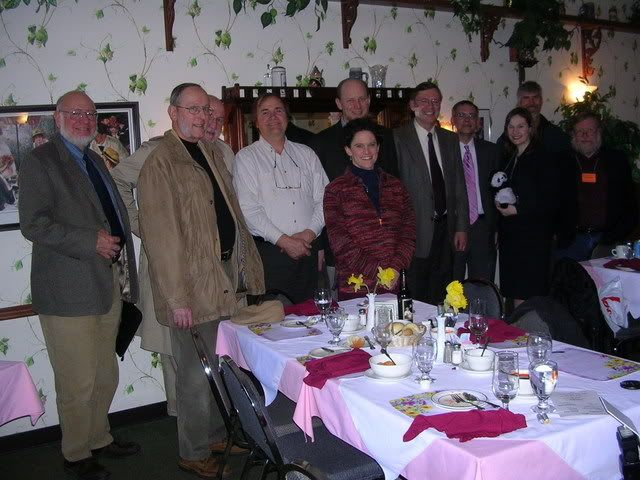
Of course, all work and no play would make for a rather dull time. Prior to the start of the symposium, the group met up for some dinner in Waverly.
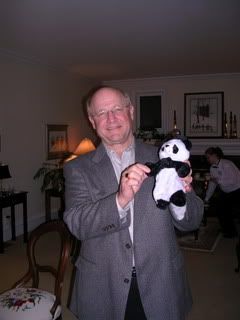 Following the final panel discussion, the president of Wartburg, Dr. Jack Ohle (at left--a native Ohioan who attended an undergrad institution near my hometown of Findlay, Ohio...small world) invited all the planners and speakers to his house for some dinner and conversation. Professor Steve Steve, of course, was an integral part of the festivities, and got to meet up with Wartburg biologist Steve Main, who proudly wore his NCSE "Scientists named Steve" T-shirt.
Following the final panel discussion, the president of Wartburg, Dr. Jack Ohle (at left--a native Ohioan who attended an undergrad institution near my hometown of Findlay, Ohio...small world) invited all the planners and speakers to his house for some dinner and conversation. Professor Steve Steve, of course, was an integral part of the festivities, and got to meet up with Wartburg biologist Steve Main, who proudly wore his NCSE "Scientists named Steve" T-shirt.
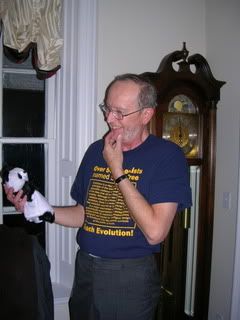
Others who were instrumental in bringing together the conference included Wartburg theology professor Brian Jones (below left), who served as the unofficial president (and secretary) of our group, pulling everything together. Craig Johnson (bottom right), a man of many hats (meteorologist, TV personality, professor,
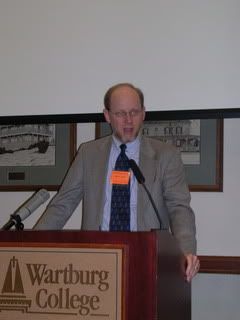 and executive director of the Iowa Academy of Science) served as the master of ceremonies, and also narrarated the DVD that was distributed at the conference. (More information about the DVD at the symposium link; contact me if you're interested in buying a copy, as I believe extras are still available).
and executive director of the Iowa Academy of Science) served as the master of ceremonies, and also narrarated the DVD that was distributed at the conference. (More information about the DVD at the symposium link; contact me if you're interested in buying a copy, as I believe extras are still available).
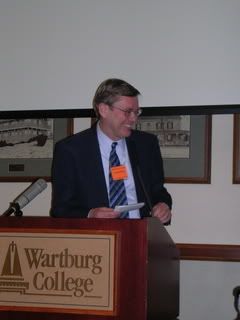 Overall, the conference was an excellent experience. I know there has been discussion here recently about how scientists should approach religion, and I'm not a religious person myself, but it was great to see that so many of us with such varied personal beliefs could all work for a common goal--keeping science education top-notch in Iowa and the U.S.
Overall, the conference was an excellent experience. I know there has been discussion here recently about how scientists should approach religion, and I'm not a religious person myself, but it was great to see that so many of us with such varied personal beliefs could all work for a common goal--keeping science education top-notch in Iowa and the U.S.

It looks like a goiod time was had by all, but I think PZ "might" be able to enliven the proceedings even more! :)
If PZ could get rid of his hatred of all things religious, I'm certain he might have had something interesting to say. Otherwise he would have just been a good shock jock.
Sounds like it was a really interesting event! I went to a science and religion symposium at Samford University earlier this year, I was glad I went (E.O. Wilson was the keynote speaker), but I think it would have been much better if there had been more interactive discussions like you describe from Iowa.
That looks fantastic. I'm teaching writing in the Social Sciences right now focusing on policy debates which culminates in broad readings pertinent to the Dover debacle and reading the Jones decision. I'd love a copy of the DVD.
Good point, David. PZ would have derailed any attempt at serious intellectual engagement with these kinds of issues.
I know I will get called out on this, but he is doing more harm than good in advancing science education.
IMHO only, of course.
Those blaze orange nametags are certainly attention-getting.
For David and Will:
As someone who has actually heard and spoken to PZ, and listened to what he has to say, I can only protest that you have made a serious mischaracterization of him.
Because he has personal opinions of religion and is not shy about expressing him is no reason to assume that he would be disrespectful of the content of the conference or his fellow attendees. I would bet it is more likely that the people who object to his bluntness would have had a more disrutptive presence.
I'm not even sure why you had to drag him into this thread, since he wasn't there. That being said, I would like to see something like this in Minnesota. It sounds like it was a very good experience.
Mike.
Read the very first comment. That's why he got dragged in. PZ would have enlivened those proceedings just as much as any shock-jock "enlivens" a radio station.
The Abrahamists can tell creation folk tales to each
other on their own time, along with scientologists and
whoever else.
In any case, evolution is a *secondary* problem for
"the religious" in the USA.
The followers of the god of Abraham need to be more
concerned why they are being remade into a
paramilitary movement.
http://www.rollingstone.com/politics/story/7235393/the_crusaders/
The Crusaders
Christian evangelicals are plotting to remake America in their own image
From the article:
-----------------------------------------------------------
The godfather of the Dominionists is D. James Kennedy, the most influential evangelical you've never heard of. A former Arthur Murray dance instructor, he launched his Florida ministry in 1959, when most evangelicals still followed Billy Graham's gospel of nonpartisan soul-saving. Kennedy built Coral Ridge Ministries into a $37-million-a-year empire, with a TV-and-radio audience of 3 million, by preaching that it was time to save America -- not soul by soul but election by election. After helping found the Moral Majority in 1979, Kennedy became a five-star general in the Christian army. Bush sought his blessing before running for president -- and continues to consult top Dominionists on matters of federal policy.
"Our job is to reclaim America for Christ, whatever the cost," Kennedy says. "As the vice regents of God, we are to exercise godly dominion and influence over our neighborhoods, our schools, our government, our literature and arts, our sports arenas, our entertainment media, our news media, our scientific endeavors -- in short, over every aspect and institution of human society."
-----------------------------------------------------------
There will be no "compromise" with theocracy, only incremental surrender.
Hrm, I'll have to keep an eye out and try and attend one of these next time around.
Kansas Citizens for Science (I am on the board of directors) is always looking for ways to smooth over the inevitable manufactured conflict that exists when discussing science in public schools.
Looks like a well done conference.
Hmmmm